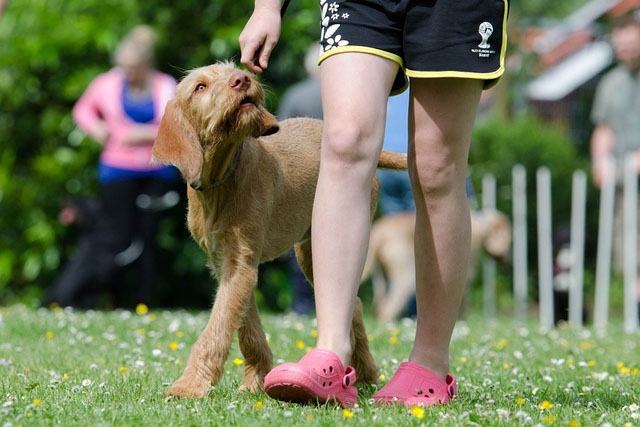



When you bring home an adopted dog, it's important to establish a routine right from the start. Dogs thrive on consistency and structure, so having a set schedule for feeding, exercise, and training will help them feel secure and understand what is expected of them. Make sure to stick to the routine as much as possible, as this will help your dog adjust to their new environment and make training easier.
Positive reinforcement is a highly effective training method for dogs of all ages and backgrounds. Instead of punishing your adopted dog for unwanted behaviors, focus on rewarding them for good behavior. This can be done through treats, praise, or playtime. By using positive reinforcement, you are teaching your dog that good behavior leads to positive outcomes, which will motivate them to repeat those behaviors.
Training an adopted dog can take time and patience. Remember that your dog may have had previous experiences or traumas that could affect their behavior and learning ability. It's important to be patient and understanding during the training process. Consistency is also key - make sure everyone in the household is on the same page and using the same training techniques and commands. This will help your dog understand what is expected of them and avoid confusion.
Socialization is crucial for any dog, but especially for adopted dogs who may have had limited exposure to different people, animals, and environments. Gradually introduce your dog to new experiences, such as meeting other dogs, encountering different types of people, and exploring new places. This will help them become more confident and well-adjusted, reducing the likelihood of behavioral issues in the future.
If you're struggling with training your adopted dog or if they have specific behavioral issues, don't hesitate to seek professional help. A professional dog trainer or behaviorist can provide guidance and support tailored to your dog's individual needs. They can help you understand the underlying causes of certain behaviors and provide you with effective training techniques to address them.
Training is not just about physical exercise - mental stimulation is equally important for a well-rounded and happy dog. Provide your adopted dog with puzzle toys, interactive games, and training exercises that challenge their mind. This will not only keep them entertained but also prevent boredom-related behaviors such as chewing or excessive barking.
Setting clear boundaries is essential for training an adopted dog. Establish rules and expectations for your dog's behavior and consistently enforce them. This includes things like not allowing them on furniture, not begging for food at the table, or not jumping on guests. By setting clear boundaries, your dog will understand what is acceptable and what is not, making training more effective.
Teaching your adopted dog basic commands such as sit, stay, come, and leave it is crucial for their safety and well-being. These commands provide a foundation for more advanced training and help you establish control and communication with your dog. Practice these commands regularly in different environments and gradually increase distractions to ensure your dog can follow them in any situation.
Reward-based training is a positive and effective method for teaching your adopted dog new behaviors. Whenever your dog performs a desired behavior, reward them with treats, praise, or playtime. This positive reinforcement will motivate your dog to repeat the behavior in the future. Avoid using punishment or harsh training methods, as they can damage the trust and bond between you and your dog.
Remember that your adopted dog may have had a difficult past, and it's important to be understanding and empathetic towards them. Some dogs may require more time and patience to overcome their fears or anxieties. Be supportive and provide a safe and loving environment for your dog to thrive in. Celebrate their progress, no matter how small, and always approach training with kindness and compassion.
Training an adopted dog can be a rewarding and fulfilling experience. By following these expert tips and advice, you can set your dog up for success and build a strong bond based on trust and understanding. Remember to be patient, consistent, and always prioritize positive reinforcement in your training efforts. With time and dedication, your adopted dog will become a well-behaved and happy member of your family.
Related posts